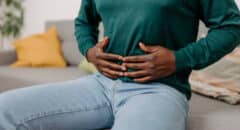
If you often have a stomachache after eating, you’re not alone, a new survey finds. One in 10 people experience frequent meal-related pain.
This includes 13% of women and 9% of men, and is most common in 18- to 28-year-olds (15%), according to an online survey of more than 54,000 people in 26 countries.
“The take-home message from this study is that people who experience meal-related abdominal pain more frequently experience other gastrointestinal symptoms,” researcher Esther Colomier, a doctoral student at KU Leuven in Belgium, and the University of Gothenburg in Sweden says.
Pain in Your Stomach: What it Could Really Be!
Symptoms of gastro issues
These individuals also were more likely to have bloating, a swollen stomach, a feeling of being too full after eating or filling up too quickly. They also reported having constipation and diarrhea, as well as more psychological distress and other symptoms.
“They also have a higher burden of psychological and somatic symptoms, such as back pain or shortness of breath, which are associated with major distress and functioning problems,” Colomier shares. “These symptoms cause distress and disruption in daily life.”
Symptoms such as constipation and diarrhea were experienced in 30% of those who reported frequent pain after eating, compared with 20% of those with occasional symptoms and 10% of others. The same applied to bloating and abdominal distension symptoms, the findings show.
RELATED: Your Digestive Disorder Can Affect Your Whole Body
How to find relief
Avoid trigger foods: Keep a food diary of everything you eat and take note of any foods that may cause you postprandial diarrhea (PD) or pain after meals. Also avoid eating fatty foods, fiber, and dairy. These foods are often associated with gastro issues.
Practice food safety: Eliminate any bacteria that may be lurking on your foods by washing your fruits and vegetables thoroughly, cooking meat to the proper temperature and refrigerating foods that should be kept cold.
Eat smaller portions: If you suffer from gastro issues, your intestines may digest food more easily if you have five to six small meals a day instead of three big ones.
Reduce stress: Stress and worry can easily upset your stomach. Try managing your stress and anxiety. This will not only help your








